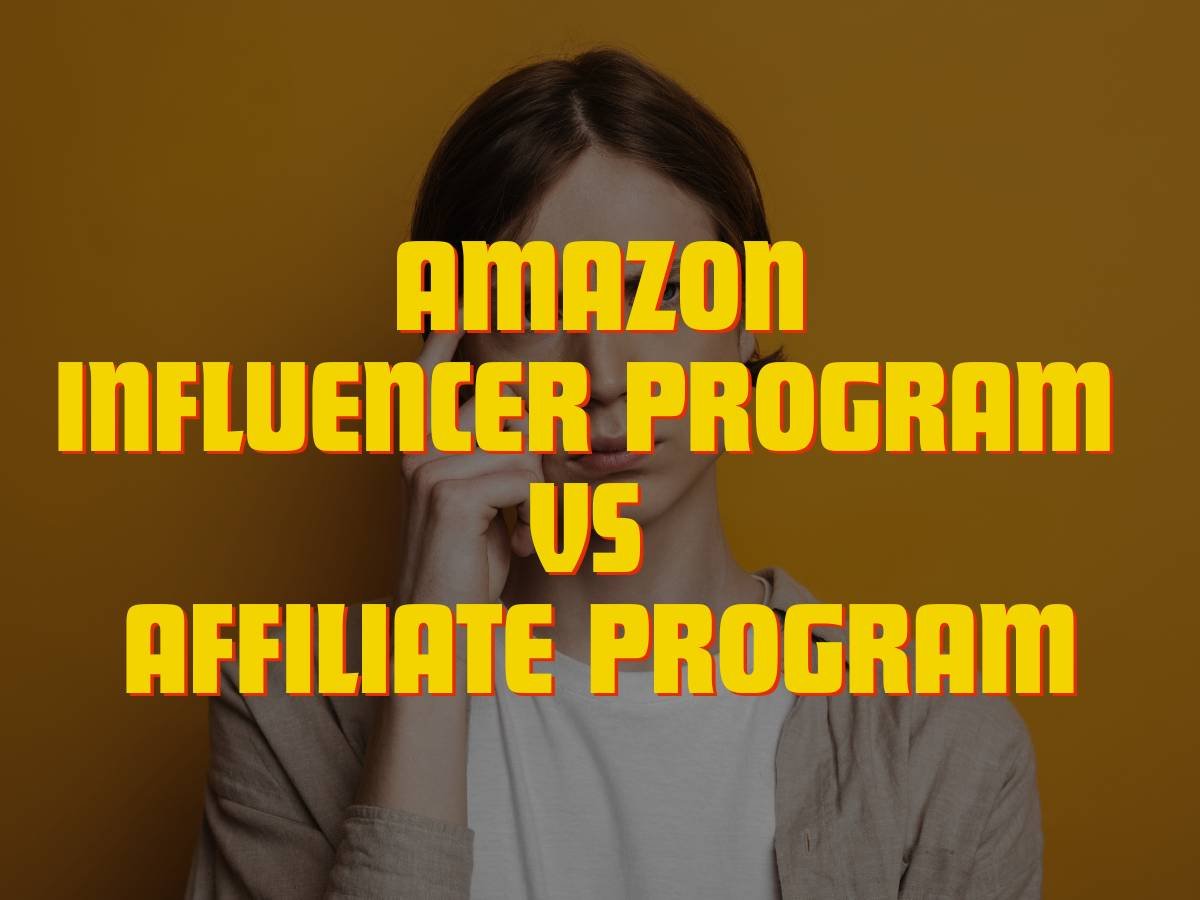amazon influencer program vs affiliate program

Endorsements are the most thriving aspect of the digital landscape. And when it comes to online shopping, Amazon reigns supreme. But for content creators looking to monetize their audience’s trust in recommendations, two options emerges: the Amazon Affiliate Program and the Amazon Influencer Program.
Both offer compelling opportunities, but understanding the key distinctions is crucial for maximizing your success. Let’s find out in the battle of Amazon influencer program vs affiliate program, which one is perfect for you.
the differences between the Amazon Influencer Program Vs Affiliate Program
If you are planning to start your income stream using the Amazon platform, there is a high possibility that you have already come across different methods people are using to earn from Amazon. Whether it’s Amazon Affiliate Marketing On Pinterest or Amazon’s influencer or Affiliate program, you should have a deep understanding of the differences to pick the perfect option, that suits you and your target audience alike.
Here are some key differences between Amazon’s Influencer and the Affiliate Programs:
1. Audience Reach
- Affiliate: Open to everyone with a website or online presence. This makes it a fantastic option for bloggers, YouTubers, and even podcasters who can weave affiliate links into their show notes. The key is to have an established audience who trusts your recommendations.
- Influencer: Selective. Requires a strong social media presence with high engagement metrics. Influencers typically thrive on platforms like Instagram and YouTube, where visuals and personality reign supreme. Building a loyal following takes time and dedication, but the potential rewards can be significant.
2. Promotion Style
- Affiliate: Individual product links are strategically woven into your content. This allows for in-depth reviews and comparisons, perfect for websites and blog posts. You can also use affiliate links in email marketing campaigns or social media bios.
- Influencer: Curated storefront showcasing a collection of favorite products. Influencers can leverage the power of Amazon to create a visually appealing and user-friendly shopping destination. This is a fantastic way to promote a wider range of products that cater to your audience’s interests. You can also use social media posts to drive traffic to your Amazon storefront.
3. Benefits
- Affiliate: Offers more flexibility in promoting specific products. Detailed content with affiliate links allows for easier conversion tracking, providing valuable insights into what resonates most with your audience.
- Influencer: Brand association with a dedicated Amazon page that you can customize to reflect your style and personality. This can lead to higher engagement on social media, as viewers can easily discover the products you recommend without leaving the platform.

Amazon’s influencer OR Affiliate program: Which is perfect for you?
1. Consider Your Platform
- Affiliates: Affiliate marketing shines on platforms that allow for detailed content creation. Websites and blogs are ideal, as you can craft long-form reviews, comparisons, and buying guides. You can also leverage email marketing lists to promote products with affiliate links.
- Influencers: Social media is the influencer’s domain. Platforms like Instagram, YouTube, and TikTok allow influencers to create engaging video content that showcases products in action. Influencers can also use eye-catching visuals and storytelling to capture attention and drive traffic to their Amazon storefront.
2. Content Creation Style
- Affiliates: If you’re a skilled writer who enjoys crafting informative content, the affiliate program is a great fit. You can leverage your writing skills to create in-depth reviews, buying guides, and comparisons that educate your audience and establish yourself as a trusted authority in your niche.
- Influencers: Do you thrive on creating captivating visuals and engaging storytelling? Then the influencer program might be your calling. By leveraging the power of video and social media, you can showcase products in a fun and informative way, inspiring your audience to learn more and visit your Amazon storefront.
3. Audience Preferences
- Affiliates: If your audience actively seeks out detailed information before making purchases, the affiliate route might be more suitable. By creating informative content with affiliate links, you can address their research needs and provide a seamless path to purchase.
- Influencers: If your audience responds better to visual inspiration and social media trends, the influencer program could be the key. By creating engaging social media content that showcases products in an interesting way, you can capture their attention, pique their curiosity, and drive traffic to your Amazon storefront.
Pro Tip: Don’t be afraid to be a hybrid! There’s no rule against leveraging both programs. You can create informative blog posts with affiliate links while building an engaging Amazon storefront to amplify your reach.
Which program offers the best commissions?
While both Amazon Affiliate and Amazon Influencer programs offer commission structures tied to product categories, the key differentiator isn’t the commission rate itself. Instead, it’s about optimizing your approach to cultivate a loyal audience and drive targeted traffic. Regardless of the program you choose, the more you can captivate your audience and effectively connect with their needs, the more sales you’ll generate.
Conclusion
The battle between Amazon’s Affiliate and Influencer programs isn’t about which is better. It’s about finding the program that best complements your content style, platform, and audience. By understanding the core differences and tailoring your approach, you can transform yourself into a powerful Amazonian product champion, earning while inspiring your audience.






